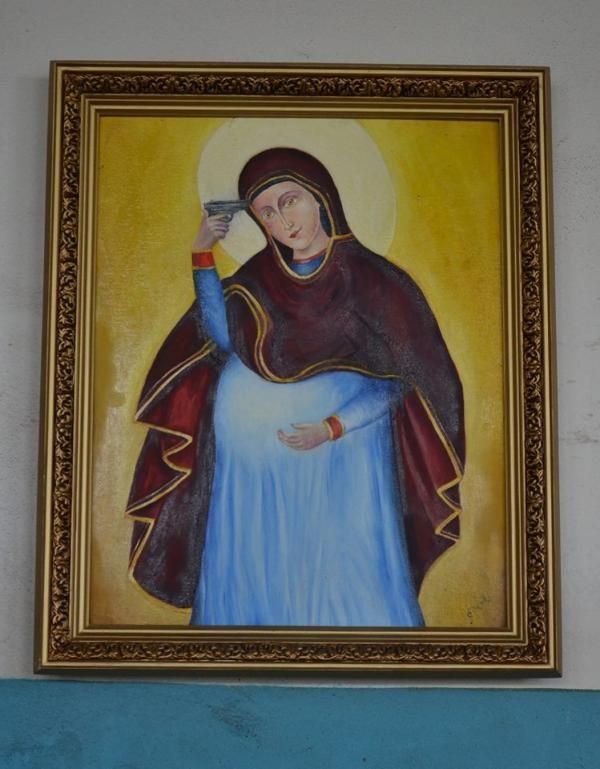Georgian clergyman curses journalist
The Patriarchate of Georgia called on its clergymen, as well as everyone ‘who cares about the church’, to refuse interviews with the Rustavi-2 channel and refrain from participation in all its programs.
The statement, which was made on the official website of the Patriarchate on 24 May, is in direct retaliation against the channel’s Archevani (Choice) show, hosted by journalist Giorgi Gabunia.
The Patriarchate claims Gabunia insulted the feelings of believers with his latest feature, called ‘The Blasphemer’. Archevani’s latest episode was devoted to the theme of freedom. Studio guests discussed the latest proposal of the government in which offending religious or other feelings can be pursued by law. Artists, writers and others can become targets of the proposed law.
The Georgian society at large regards this initiative as an attempt to introduce censorship and restrict freedom of expression. In the programme, Gabunia used a scandalous picture by Georgian artist Leah Ukleb called ‘Suicide of the Virgin Mary’ in which a pregnant Mary puts a toy gun to her forehead.

Ukleb’s work has repeatedly become the object of sharp criticism by the Patriarchate and the conservative part of Georgian society. TV show participants pointed out that once the new law is enforced, the court can simply ban this work of art.
At the beginning of the broadcast, Gabunia informed his guests that the weapon in the hands of Maria was a toy gun, so she would not be able to commit suicide and would subsequently give birth to Jesus.
This utterance evoked the wrath of an influential clergyman, Metropolitan Bishop Ioba of Urbnis. In a sermon, he cursed the journalist, calling him a ‘servant of the devil’.
“This man must get out of not only journalism but Georgia in general! … I curse him, he will not repent, because he is a direct servant of the devil,” declared Bishop Ioba.
In the sermon he also stated that ‘the entire Rustavi-2 TV channel should be disbanded’ because it serves as a platform from which ‘poison splashes out on the people’.
The Patriarchate’s position
The Patriarchate released a statement after Bishop Ioba’s sermon.
“First of all, we urge our clergy to stop any contact with the Rustavi-2 TV company, not to give interviews and not to participate in any broadcast of this TV company. It is desirable that this approach is accepted by all who cherish the church and our values,” the statement reads.
The Patriarchate believes that certain forces are deliberately fighting the church, trying to present it as an opponent of free expression, with Rustavi-2 referring to the church as a pro-Russian force.
“The church is the abode of God, it cannot be connected with politics, be pro-Russian or pro-Western,” the statement said.
The clergy called on the authorities to ‘act quickly and effectively and protect society through legal and other mechanisms, as well as to implement appropriate policies to avoid uncontrollable processes’.
Rustavi-2 responds
The general director of Rustavi-2 TV, Nika Gvaramia, stated that the position of the Patriarchate was developed by its ‘retrograde administration’ and that Patriarch Ilia II is not aware of the events.
“The actions of Bishop Ioba and the statement of the Patriarchate exacerbate fears about possible retribution … From now on, responsibility for possible violent actions against Rustavi-2 staff, including Giorgi Gabunia, will fall on the Patriarchate of Georgia,” Gvaramia said.
In his opinion, ‘the Patriarchate has become a haven of dark, pro-Russian forces that oppose the development of the country, the development of the Georgian church and the Euro-Atlantic development of Georgia’. He stressed that ‘the Georgian church never cursed the enemy of Georgia, Vladimir Putin, yet it curses Rustavi-2’.
Representatives of non-governmental organizations also regard the Patriarchate’s statement as one aimed at limiting freedom of expression.
“Their demands, which usually have a serious impact on Georgian policy, concerns the establishment of regulation issues protected by the Constitution. It is the freedom of self-expression. Naturally, the Patriarchate, as one of the largest and most influential institutions, has a certain fear of criticism. Therefore, it tries to protect itself, but not by words in exchange for words, opinion for an opinion, but by enforcing silence,” Giorgi Mshveniradze, chairman of the non-governmental organization Democratic Initiative of Georgia, told Rustavi-2.
This is not the first time the Patriarchate accuses journalist Giorgi Gabunia of insulting the feelings of believers. In March, Gabunia featured a story about the relocation of century-old trees from the Adjara and Guria regions of Georgia to the billionaire Bidzina Ivanishvili’s park. During the show he proclaimed that ‘Jesus Christ made a mistake two thousand years ago when he chose Israel for his sermons – he should have come to Adjara as he would not have been crucified there – there would be nothing to make a cross from in this region’. This phrase evoked not only the wrath of the Patriarchate, but also the actions of the neo-Nazi organization Georgian March who gathered at the office of Rustavi-2. They trapped Gabunia in his car and physically assaulted another journalist.



















